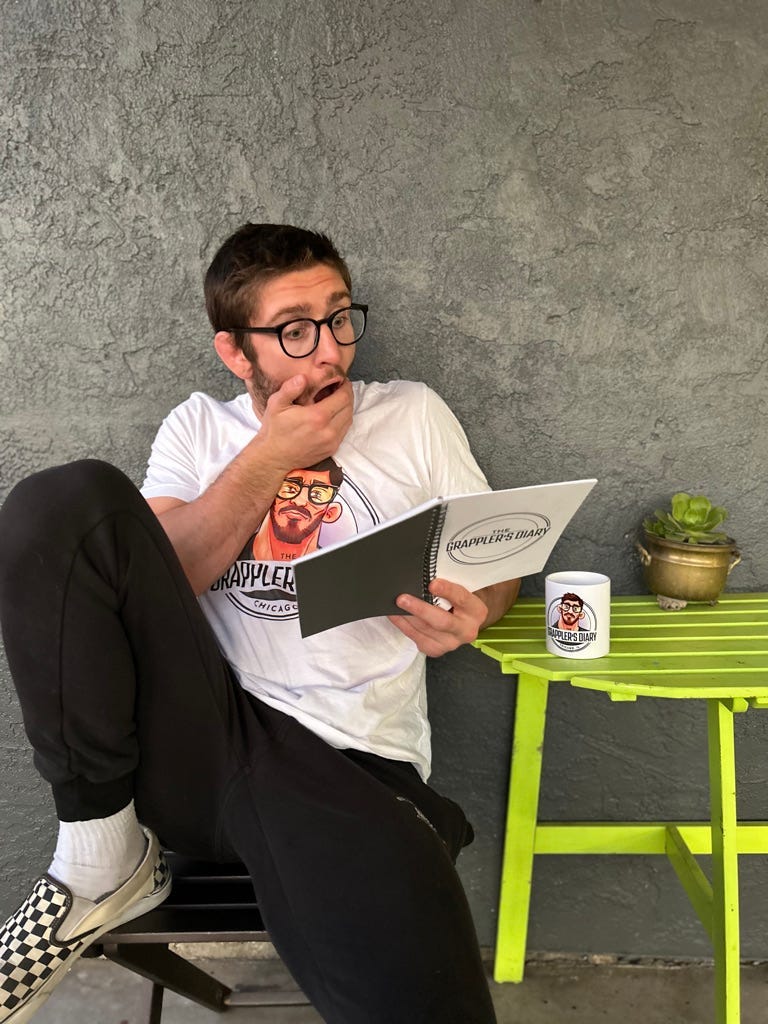
A few years ago, I read a book by the psychologist Jordan Peterson called 12 Rules For Life.
Around that time, a lot of people were mad about Peterson’s political views — a lot of which were and are fairly controversial — but this article isn’t about that. This article isn’t even really about him or his book. This article was actually inspired by an episode of Malcolm Gladwell’s podcast, Revisionist History.
This article is about Jiu-Jitsu lessons, life lessons, and how they relate together.
Instead of “12 rules for life” — I can give you rules for life in the world of Jiu-Jitsu. After sitting with my thoughts for a while, I managed to come up with 12 of them.
Luckily, I think a lot of them will help you in normal life too.
1. Tap early — especially in practice.
Injuries happen — both on the mat and in life — but most of the time, they’re our fault and completely avoidable.
When you think carefully about it, most injuries that happen are not “freak accidents”. They have a root cause and usually, the root cause is your own stubbornness, pushing yourself too hard, or some other error of the ego.
Don’t be stubborn over things that don’t matter. The result of a training round is one of those things.
Learn to see the bigger picture.
2. You get out what you put in.
This isn’t really advice as much as it is a warning. It’s a rule that I’ve found and believed to be true.
If you train 3 times a day, you’ll get better results than someone who trains once per day. If you post articles every day, you’ll get better results than someone who posts once per week.
At the same, however, you also have to deal with the consequences and side effects of your choices. Overtraining, haters, injuries, and more.
Don’t give more than you can handle.
3. Don’t bother white belts while they are playing.
This is directly from the guy's book, but instead of white belts, he talks about children.
Either way, it’s important to allow beginners to be beginners. Allow them to experiment, discover things on their own, and fall in love with the game for themselves. As an instructor, don’t overcorrect.
If your instructor overcorrects you, go cross-train and experience what it’s like to be a beginner at something and have absolutely no one give a crap about your progress.
This will lead to a higher retention rate, better development, and more happiness for beginners in different skills.
4. BJJ is not life. Nothing is life.
My girlfriend and I just finished watching this show called Ted Lasso.
If you’re a sports fan, I recommend you check it out. It’s funny, wholesome, and has a lot of good life lessons.
One of the characters, a Mexican striker named Dani Rojas, loves football (soccer). He always proclaims that “football is life”. It’s his catchphrase.
But Dani is wrong when it comes to the content of his catchphrase. There’s more to life than sports. There’s always more to life than your occupation.
Forgetting this fact is a good way to begin your descent into madness.
5. The self does not exist.
This is going to get a bit weird and meta, but if you follow, you’ll learn a valuable lesson that helped me a lot in pretty much everything I do.
The self does not have a tangible location.
There are a few regions in our brain that make up our sense of self, but the actual sense of self doesn’t really “exist”. It’s not like your arm, your leg, or your nose.
Yet for some people, the “sense of self” is the biggest part of their existence.
Either way, when you do crazy things to please your ego (like not tapping in dangerous submissions or getting mad at a training partner), you’re literally trying to please something that isn’t real. Are you insane? You’re allowing your physical body to break in the name of pleasing something imaginary.
This logic isn’t faulty, unfortunately.
A good relationship with your ego is very important, and although we talk about how “Jiu-Jitsu humbles you”, I think a lot of people would benefit from taking the time to focus on managing their relationship with their ego.
6. Doing is better than thinking — philosophy falls short in reality.
You’re anxious because you’re always thinking. Action is the easiest anxiety cure.
The more you think about something (like talking to a girl at a party, competing in Jiu-Jitsu, or writing a novel), the scarier it gets.
This is why you have those weird academics who have lots of books but no life skills. You have people who are very accomplished but take a joke at their expense. Black belts who know lots of moves but can’t actually do any of them on anyone of skill.
Think and study, but act more than you think. Test what you learn.
Produce more than you consume.
7. Status does not denote skill.
We deal with this a lot in Jiu-Jitsu because for some reason, people think that being a black belt makes you an expert in all things Jiu-Jitsu, grappling, and oftentimes even life.
This is not true. Status and skill are different things. Competency, you could argue, is even a 3rd thing entirely.
You can achieve status with skill, but you also achieve skill without status.
Try to surround yourself with people of skill before you worry about status.
8. Routine is the key to success.
An exciting life is not as profitable as a disciplined one.
Training for one hour per day, 6 days per week, is better than training once per week for 6 hours. You get more out of a session when you process it, digest it, and improve on it than you do if you just do everything you can in one go.
Skill development is about consistency, not extreme action.
Beware of the person who’s willing to be boring to get what they want.
9. Don’t aim to be like anyone else, but aim to learn from everyone else.
I see a lot of courses online where people tell you that they’re going to teach you how to do what they’ve done.
Build an audience, learn leg locks, make money, develop a winning mindset — whatever.
It’s all hoopla.
The odds of you following someone’s programming and identically replicating their results are extremely slim. It’s a bad idea to even follow this mindset — it’s limiting.
Instead of trying to be like someone whose work you admire, try to learn things from them. A move here. A mental model there. A quote.
Something small — but applicable.
Instead of having idols, have mentors.
10. Test yourself.
Competing is a great way to test yourself in Jiu-Jitsu, but it’s not the only way.
You can test yourself in the training room, by going to other training rooms, working hard in the weight room, giving it your all on the track, or just pushing in whatever else you like to do. Either way, testing yourself at things you love to do is one of the best ways to make progress.
This is also why it’s really important to cover your bases on the ego stuff we talked about above. Your tests probably won’t always go well and you need to know how to deal with it.
Because of that, you need a healthy relationship with your ego. This is how you build longevity.
This is also true, I’ve found, in life. One of the best ways I’ve been able to improve my skills has been through frequent testing of my skills and being able to handle not getting the results I want sometimes.
11. Nothing wrong with a few battle scars.
I have cauliflower ear, 2 torn shoulders, herniated discs, and more — all from Jiu-Jitsu.
I don’t really regret any of it.
I don’t love having these injuries. I don’t romanticize them. However, if those injuries were the cost of the great experience I’ve had in Jiu-Jitsu, the success I’ve had, and the friendships I’ve acquired, they’re a price that I would pay over and over again.
A lot of people are scared to get hurt.
Maybe it’s a bit corny, but I’d rather be battered than scared to get battered, any day of the week.
Just make sure your battle scars don’t come from not tapping early.
12. Wear your heart on your sleeve.
In general, when you keep your plans close to your chest, don’t tell anyone how you feel, and act extremely cautiously, it’s normally because you don’t want bad things to happen to you.
The problem is, whether or not you wear your heart on your sleeve, bad things will still happen to you sometimes, the same way that bad things happen to all of us sometimes.
This is okay, but what I’ve found is that the more upfront I am with people, the more I’m willing to ask for help, and the more open I am, the better support system I have when bad things do end up happening to me.
All of the opportunities that I’ve gotten from Jiu-Jitsu and writing have come from being upfront, direct, and honest — even if it means that sometimes I get burned.
If you’re scared of getting burned, reread point #11.
The Grappler’s Diary now has merch!
Do you love reading The Grappler’s Diary on Instagram, Twitter, or Substack?
If you’re a fan of the newsletter and want to help me grow this to the next level, check out my online store which is now live.
Right now, I have coffee mugs and “diaries” (or notebooks) available on the site, and more stuff (like the T-shirt I’m wearing in the photo for this article) will be coming soon.
You can check out my merch here. Thank you for your continued support.




